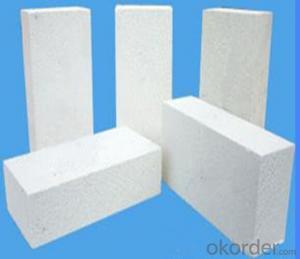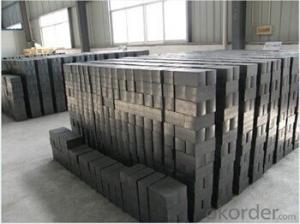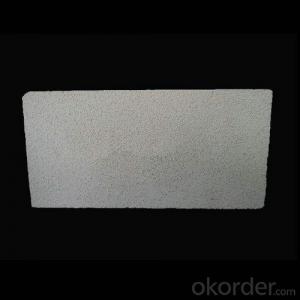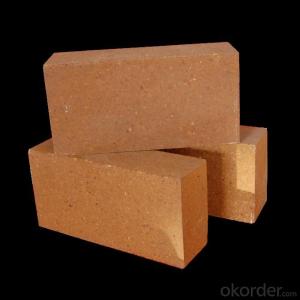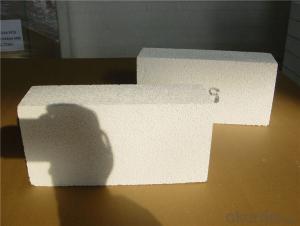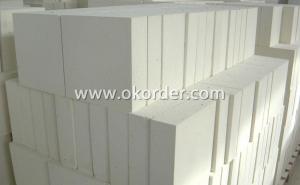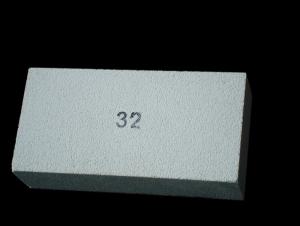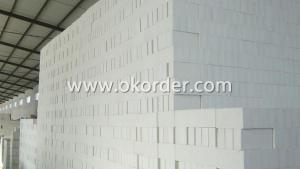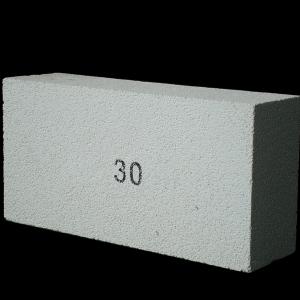Refractory GJM Mullite Insulation Brick B-2
- Loading Port:
- Shanghai
- Payment Terms:
- TT OR LC
- Min Order Qty:
- 10 m.t.
- Supply Capability:
- 1000 m.t./month
OKorder Service Pledge
OKorder Financial Service
You Might Also Like
Specifications
mullite insulation brick
1. Low thermal conductivity
2.High hot compressive strength
3.Perfect Energy saving
Light weight mullite insulation furnace bricks refractory for sale
Advantage
1. Low thermal conductivity
2.High hot compressive strength
3.Perfect Energy saving
Description:
Lightweight mullite kiln bricks refractory for sale are made from good quality and superpure raw materials, with strictly classified fillings according to their grades. These fillings can form a uniform pore structure after burnt during the process of manufacture. Each grade of products has unique design to meet different thermal, physical and chomical demands.
Application:
Mullite insulation furnace bricks refractory material can be used in linings or heat-insulating materials of the industries, such as, ethylene pyrolysis furnaces, tubular furnaces, reforming furnaces of synthetic ammonia, gas generators and high-temperature shullte kilns, etc
Mullite Insulation furnace refractory material can be used as working lining, where contact with flames directly. This kind of brick can save the kiln energy very much
- Q:Are insulating fire bricks suitable for insulation in walls?
- Insulating fire bricks are not typically suitable for insulation in walls. While they are excellent for high-temperature applications, such as lining furnaces or kilns, they have limited insulation properties when it comes to walls. Insulating fire bricks have lower thermal conductivity than regular bricks, meaning they conduct heat at a slower rate. However, they are not as effective as other insulation materials specifically designed for walls, such as fiberglass, foam boards, or mineral wool. These materials are specifically engineered to provide superior insulation properties, such as higher R-values, which measure the material's resistance to heat transfer. Additionally, insulating fire bricks are often more expensive and heavier than other insulation options, making them less practical for wall insulation. Therefore, while insulating fire bricks have their advantages in certain applications, they are generally not the best choice for insulating walls.
- Q:Are insulating fire bricks suitable for use in glass melting furnaces?
- Yes, insulating fire bricks are suitable for use in glass melting furnaces. Insulating fire bricks have high thermal resistance and low thermal conductivity, making them ideal for retaining heat and preventing heat loss in the furnace. Additionally, their lightweight and porous nature allow for efficient energy utilization and reduced fuel consumption.
- Q:Can insulating fire bricks be used for insulation in solar thermal systems?
- Yes, insulating fire bricks can be used for insulation in solar thermal systems. Insulating fire bricks are specially designed to have low thermal conductivity, which means they can effectively trap and retain heat. This makes them suitable for insulating the components of a solar thermal system, such as the solar collector and the storage tank, to minimize heat loss and increase the overall efficiency of the system. Additionally, insulating fire bricks are able to withstand high temperatures, which is crucial in solar thermal systems where temperatures can reach extremes. Overall, using insulating fire bricks for insulation in solar thermal systems can help improve their performance and reduce energy loss.
- Q:How do insulating fire bricks compare to other refractory materials?
- Insulating fire bricks have a lower thermal conductivity compared to other refractory materials, making them more effective in preventing heat loss. They are also lightweight and have good insulation properties, making them suitable for applications where thermal insulation is crucial. However, they may have lower mechanical strength and higher porosity compared to other refractory materials, limiting their use in certain high-temperature and high-pressure environments.
- Q:Can insulating fire bricks be used in thermal insulation panels?
- Yes, insulating fire bricks can be used in thermal insulation panels. Insulating fire bricks are designed to have high thermal resistance, making them suitable for applications where heat insulation is required. They can be used in various forms, including as a lining material for thermal insulation panels, to provide effective insulation and prevent heat transfer.
- Q:Outside brick wall, inside brick wall how to return a responsibility?
- Use in indoor environment using brick, not so bad, are generally Youmianzhuan, of course there are all the tiles, bricks, colorful patterns, the appearance of small size error.
- Q:Can insulating fire bricks be used to line industrial boilers?
- Industrial boilers can be lined with insulating fire bricks, which have low thermal conductivity and can minimize heat loss and enhance energy efficiency. These bricks, made of lightweight materials like clay and alumina, possess excellent insulation properties. By lining the boiler's interior with these bricks, the heat generated during combustion can be contained, resulting in greater heating efficiency and decreased fuel consumption. Moreover, these bricks are capable of withstanding high temperatures and thermal shocks, making them ideal for the challenging conditions commonly found in industrial boilers. Overall, utilizing insulating fire bricks as lining material can lead to improved energy efficiency, reduced operating expenses, and enhanced durability of the boiler system.
- Q:Do insulating fire bricks expand and contract with temperature changes?
- Yes, insulating fire bricks do expand and contract with temperature changes. Like any material, when exposed to heat, the insulating fire bricks expand, and when cooled, they contract. This expansion and contraction occur due to the thermal expansion coefficient of the material, which determines how much it will expand or contract for a given change in temperature. It is important to consider this property when using insulating fire bricks in applications where temperature fluctuations are expected, as failure to account for the expansion and contraction may lead to structural damage or cracking.
- Q:Can insulating fire bricks be used in rotary kilns?
- Yes, insulating fire bricks can be used in rotary kilns. Insulating fire bricks are designed to have low thermal conductivity, which means they are able to withstand high temperatures while minimizing heat loss. This makes them suitable for use in rotary kilns, which are used in various industries for processes such as calcination, sintering, and roasting. By using insulating fire bricks in rotary kilns, the heat generated inside the kiln can be effectively contained, leading to greater energy efficiency and cost savings. Additionally, the insulating properties of these bricks help to reduce the temperature on the outer surface of the kiln, making it safer for operators to work around the equipment. Overall, insulating fire bricks are a suitable option for rotary kilns, providing excellent thermal insulation and contributing to the overall performance and longevity of the kiln.
- Q:Can insulating fire bricks be cut to custom sizes?
- Yes, insulating fire bricks can be cut to custom sizes. These bricks are made from lightweight materials such as ceramic fibers, which make them easier to shape and cut according to specific requirements.
1. Manufacturer Overview |
|
|---|---|
| Location | |
| Year Established | |
| Annual Output Value | |
| Main Markets | |
| Company Certifications | |
2. Manufacturer Certificates |
|
|---|---|
| a) Certification Name | |
| Range | |
| Reference | |
| Validity Period | |
3. Manufacturer Capability |
|
|---|---|
| a)Trade Capacity | |
| Nearest Port | |
| Export Percentage | |
| No.of Employees in Trade Department | |
| Language Spoken: | |
| b)Factory Information | |
| Factory Size: | |
| No. of Production Lines | |
| Contract Manufacturing | |
| Product Price Range | |
Send your message to us
Refractory GJM Mullite Insulation Brick B-2
- Loading Port:
- Shanghai
- Payment Terms:
- TT OR LC
- Min Order Qty:
- 10 m.t.
- Supply Capability:
- 1000 m.t./month
OKorder Service Pledge
OKorder Financial Service
Similar products
New products
Hot products
Related keywords
